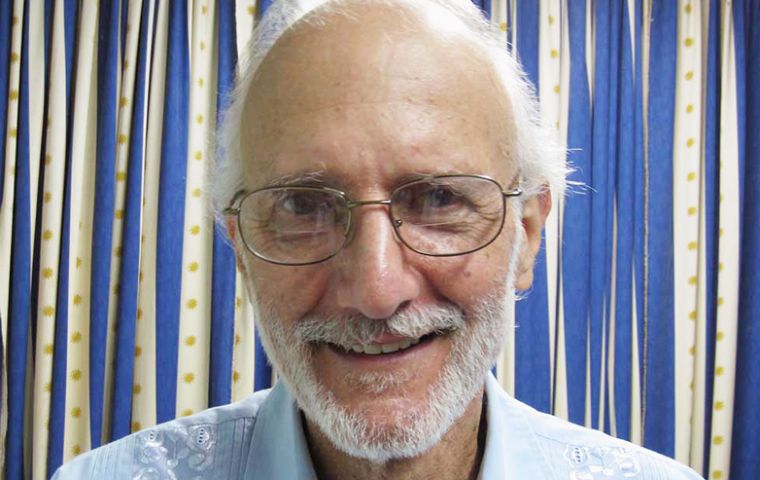MercoPress. South Atlantic News Agency
US, Cuba to resume full diplomatic ties
 US citizen Alan Gross' release from Cuban prison for humanitarian reasons paved the way for full diplomatic ties to be restored. (Pic AP)
US citizen Alan Gross' release from Cuban prison for humanitarian reasons paved the way for full diplomatic ties to be restored. (Pic AP) Presidents Obama and Castro finalize details over the telephone, make announcement. US restrictions require Congressional approval to be fully lifted. Alan Gross released. Other swaps ensue.
The United States and Cuba are to resume full diplomatic ties, which have been severed for over 50 years. Presidents Barack Obama and Raúl Castro announced separately on Wednesday, following the release for humanitarian reasons of US citizen Alan Gross, imprisoned in Cuba since 2009 in coincidence with an exchange of three Cubans convicted of espionage in Miami for one unnamed US intelligence asset.
The US, which has had a tight trade embargo on Cuba since 1961, is now set to announce a loosening of economic and travel restrictions, although limitations will not be lifted altogether. Any travel that falls into 12 approved categories such as family visits, official government business, and trips for journalistic, educational and research purposes can go ahead fairly easily, as well as humanitarian travel. But tourism or any visit that does not fall into the 12 approved categories—remains prohibited, White House sources explained. The wider travel ban can only be lifted by Congress. Obama said he would seek that Congressional approval but will likely face a struggle.
According to reports circulating in Washington on Wednesday, Cuba is, in addition to Gross, releasing a “US intelligence asset” who has been imprisoned on the island Cuba for almost 20 years . This person, a Cuban national, is said to be have been responsible for some of the most important intelligence and counterintelligence“ operations in recent years, having provided information that led to the prosecution of high-level administration officials. White House Press Secretary Josh Earnest dubbed the man ”probably the most highly valued intelligence asset on Cuban soil.” Other inmates who have been marked by the Obama administration to the Cuban authorities as political prisoners have either been freed already or will be so shortly.
Obama and Castro finalized on Wednesday in a 45-minute phone call negotiations which have been taking place for over a year. Wednesday's was the first substantial talk between leaders of the two countries since 1961, although both presidents met last year in South African for Nelson Mandela's funeral. US presidential sources did not rule out Wednesday a possible Obama trip to Havanna in the coming months.
Alan Gross flew on an American government plane which landed at Andrews Air Force Base early Wednesday afternoon and the United States sent back three Cuban spies who had been in an American prison since 2001.
Gross was working as a subcontractor for the US Agency for International Development (USAID) delivering satellite telephone equipment that was capable of cloaking connections to the Internet when he was arrested in 2009. USAID has been accused of trying to incite dissent and political change in Cuba through clandestine programs. Gross was tried and given a 15-year prison sentence, of which he has served five. Gross is said to be in poor health, having lost over 100 pounds during his five years of incarceration, which included a hunger strike. He reportedly also suffers from severe hip pain and has almost lost sight in his right eye.
A recent investigation by the Associated Press (AP) this year into work by USAID revealed that, among other things, it “established a Twitter-like service in Cuba [ZunZuneo] and secretly sought to recruit a new generation of dissidents there while hiding ties to the US government.” An August investigation by AP also found that the agency had sent Latin youth to Cuba disguised as tourists to “scout for people they could turn into activists” on the island. The proposed policy for USAID, according to AP, would prohibit the agency from spending money on democracy programs in countries that reject the agency's assistance and where USAID would have to go to “excessive lengths to protect program beneficiaries and participants.”
The most notorious US-led covert operation in Cuba was the 1961 failed Bay Of Pigs operation, aimed at toppling Fidel Castro, the charismatic revolutionary leader and brother of the current president.




Top Comments
Disclaimer & comment rules-

Read all commentsI ask this to any of you south American commies. If the Cuba system was and is so great.
Dec 22nd, 2014 - 12:09 am 01. Why does it need the USA markets?
2. Why did the USER have to subsidize Cuba?
3. Why did Venezuela have to subsidize?
4. Why has their economy turned primitive...to bartering?
5 How did the Castro boys become billionaires as the people live in abject poverty?
Axel........this the model you adore? Do you South American commies abhor that hard work gets you more than someone who does not work hard?
Commenting for this story is now closed.
If you have a Facebook account, become a fan and comment on our Facebook Page!